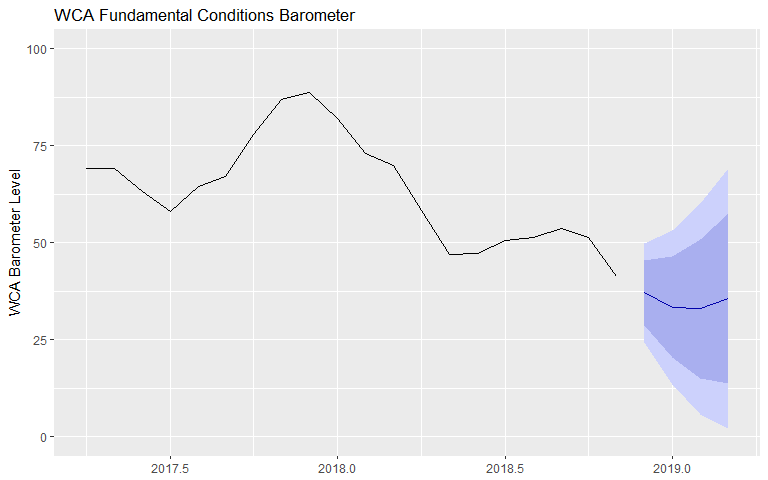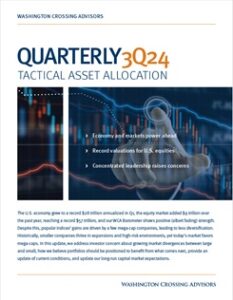Monday Morning Minute ~ January 7, 2019
Some Start of Year Housekeeping
At the start of each year, we take some time to lay out the expectations that drive tactical decisions in the CONQUEST portfolios. We also engage in a few “housekeeping” activities to keep portfolios properly aligned with their respective benchmarks. The 2019 Viewpoint is now available and is a great resource to accompany the CONQUEST Tactical ETF portfolios. To order hard copies of the report, please drop us an email with the number of reports you want sent to you.
CONQUEST 2019 Housekeeping
- Increasing Allocation to “Satellite”: As we discuss in our 2019 Viewpoint, we expect to see modest long-run equity market returns. In such an environment, tactical decisions become more important versus buy-and-hold decisions. Therefore, we are bumping up the “Satellite” portion of portfolios, which are dedicated to shorter-term tactical positioning, by 10% for most CONQUEST portfolios (to 30% from 20% for most portfolios). The longer-term oriented “core” is being reduced by 10% (to 70% from 80% for most portfolios). Changes in the WCA Fundamental Conditions Barometer typically drive these changes.
- Trimming Equity Exposure: Each month we update our WCA Fundamental Conditions Barometer (chart, below), which drives the mix of stocks and bonds in the satellite. It seeks to quantify an objective answer the question “Which way are most of the trends in the data generally headed?” Throughout the past year, the barometer fell due to worsening foreign conditions and investor risk appetite even as the domestic economy remained strong. The barometer’s slippage led us to reduce equity exposure in favor of bonds. Looking forward, our base case envisions an upturn in 2019, but we have yet to see much hard evidence that shows this process has actually begun.
- Moving to Overweight Duration: Recently, we increased exposure to long-term Treasuries, leaving the portfolios with a somewhat longer duration than the benchmark. The decline in the WCA Barometer to below 50 further justifies some extension of duration, in our view.

Keeping Perspective
The overall message of the markets in the past few months has been one of caution. Bonds have generally outperformed stocks, there have been more declining stocks than advancing ones, energy prices have been falling, credit spreads have been widening, global growth seems to be slowing, and so on. Increased volatility means we should expect to see a period of wide swings in markets that can cut in both directions. Especially at times like these, it can be very helpful to have in place a balanced and systematic investment perspective that can adapt to changing conditions. Such an approach can help prevent shortsighted, emotional, knee-jerk decisions which often tend to be bad ones.
If there is a silver lining in the market’s recent behavior it is most likely the positive implications of resetting expectations. The S&P 500’s forward-looking earnings multiple is now back in line with historic averages, corporate yield spreads are wider, and pockets of extreme enthusiasm (think cryptocurrency in late 2017) have been tempered. All else being equal, forward-looking long-run returns are helped by today’s more realistic valuations, even though the adjustment process getting here has been painful.
Last week, CONQUEST portfolios were rebalanced and reset to reflect our updated views as we begin a new year. Please feel free to contact us at 973-549-4052 with any questions about the CONQUEST portfolios.
Kevin Caron, CFA, Senior Portfolio Manager
Chad Morganlander, Senior Portfolio Manager
Matthew Battipaglia, Portfolio Manager
Suzanne Ashley, Analyst
(973) 549-4168
www.washingtoncrossingadvisors.com
www.stifel.com
Disclosures
WCA Fundamental Conditions Barometer Description: We regularly assess changes in fundamental conditions to help guide near-term asset allocation decisions. The analysis incorporates approximately 30 forward-looking indicators in categories ranging from Credit and Capital Markets to U.S. Economic Conditions and Foreign Conditions. From each category of data, we create three diffusion-style sub-indices that measure the trends in the underlying data. Sustained improvement that is spread across a wide variety of observations will produce index readings above 50 (potentially favoring stocks), while readings below 50 would indicate potential deterioration (potentially favoring bonds). The WCA Fundamental Conditions Index combines the three underlying categories into a single summary measure. This measure can be thought of as a “barometer” for changes in fundamental conditions.
The information contained herein has been prepared from sources believed to be reliable but is not guaranteed by us and is not a complete summary or statement of all available data, nor is it considered an offer to buy or sell any securities referred to herein. Opinions expressed are subject to change without notice and do not take into account the particular investment objectives, financial situation, or needs of individual investors. There is no guarantee that the figures or opinions forecasted in this report will be realized or achieved. Employees of Stifel, Nicolaus & Company, Incorporated or its affiliates may, at times, release written or oral commentary, technical analysis, or trading strategies that differ from the opinions expressed within. Past performance is no guarantee of future results. Indices are unmanaged, and you cannot invest directly in an index.
Asset allocation and diversification do not ensure a profit and may not protect against loss. There are special considerations associated with international investing, including the risk of currency fluctuations and political and economic events. Investing in emerging markets may involve greater risk and volatility than investing in more developed countries. Due to their narrow focus, sector-based investments typically exhibit greater volatility. Small company stocks are typically more volatile and carry additional risks, since smaller companies generally are not as well established as larger companies. Property values can fall due to environmental, economic, or other reasons, and changes in interest rates can negatively impact the performance of real estate companies. When investing in bonds, it is important to note that as interest rates rise, bond prices will fall. High-yield bonds have greater credit risk than higher-quality bonds. The risk of loss in trading commodities and futures can be substantial. You should therefore carefully consider whether such trading is suitable for you in light of your financial condition. The high degree of leverage that is often obtainable in commodity trading can work against you as well as for you. The use of leverage can lead to large losses as well as gains.
All investments involve risk, including loss of principal, and there is no guarantee that investment objectives will be met. It is important to review your investment objectives, risk tolerance and liquidity needs before choosing an investment style or manager. Equity investments are subject generally to market, market sector, market liquidity, issuer, and investment style risks, among other factors to varying degrees. Fixed Income investments are subject to market, market liquidity, issuer, investment style, interest rate, credit quality, and call risks, among other factors to varying degrees.
This commentary often expresses opinions about the direction of market, investment sector and other trends. The opinions should not be considered predictions of future results. The information contained in this report is based on sources believed to be reliable, but is not guaranteed and not necessarily complete.
The securities discussed in this material were selected due to recent changes in the strategies. This selection criteria is not based on any measurement of performance of the underlying security.
Washington Crossing Advisors LLC is a wholly owned subsidiary and affiliated SEC Registered Investment Adviser of Stifel Financial Corp (NYSE: SF).



